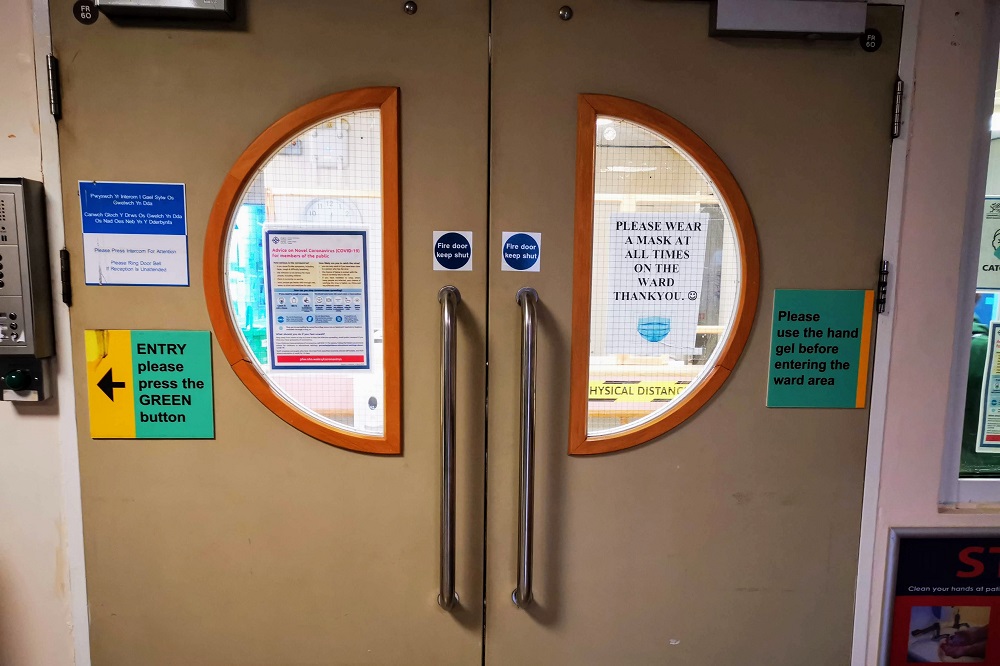New reports says second Covid wave was more challenging in healthcare settings than the first

A new report from Public Health Wales says the second wave of the Covid pandemic was significantly more challenging for healthcare settings than the first.
The report ‘Nosocomial COVID-19 in Wales: Lessons Learned from Hospital Outbreaks, September 2020 – April 2021’, looks at hospital-acquired Covid over the second wave of the pandemic, and reviews how effectively lessons learned in the first wave were implemented.
In the report, PHW says the second wave was more difficult largely due to more comprehensive routine care taking place, including elective services, whereas in the first wave this was mostly cancelled.
In addition, vaccinations were not widely available until later in this second wave, and there was a high level of asymptomatic transmission of Coronavirus among staff, leading to ongoing staff absences which increased pressure on an already stretched service.
It also says, that during the second wave, some patients were moved unnecessarily, which could have been linked to outbreaks and describes the infrastructure of hospitals is an ongoing challenge in terms of effective infection prevention and control.
The paper also identified a need to make better use of data from community settings, as this can act as an ‘early warning system’ to enable hospital staff to act proactively, rather than responding reactively when Covid-19 cases occur.
It adds that some lessons from the first wave were implemented, including an increased awareness of asymptomatic transmission and also those who presented with atypical symptoms – both of these influenced testing protocols in hospitals on both a local and national level.
Lateral flow tests
In addition, staff were encouraged not to move between Covid and non-Covid areas, and daily symptom checks, and the arrival of Lateral Flow Devices later on in the period, allowed staff who were asymptomatic or with atypical symptoms to be identified before exposure to patients.
The report concludes that these actions mitigated the spread of Covid in healthcare settings and this knowledge will be important in the management of future seasonal waves of Covid, or challenges presented by new variants.
A separate report, ‘Mortality in Nosocomial COVID-19 Cases in Wales’, looked at data from 9000 patients with hospital-acquired Covid-19 and concluded that the proportion of deaths where Coronavirus was acquired in healthcare settings was consistent with the level in community-acquired infections.
It found that the rate of mortality from all causes approximately one month after diagnosis (known as all-cause mortality or ACM) for those patients who caught Covid in hospital, was consistent with the rate in those patients in hospital who had caught the virus in the community – once other factors had been accounted for.
Medical conditions
Patients who needed an extended period in hospital – more than a week – are also more likely to have two or more diseases or medical conditions such as diabetes or other chronic conditions which also increase the chance of dying with Covid.
Patients already in hospital are also generally older and therefore more likely to have these comorbidities.
The report uses data that takes these factors into account to give a clear picture of the impact of hospital-acquired transmission on the all-cause mortality rate.
Once these factors are taken into account, there is no significant difference between the rate of mortality of those who acquired Coronavirus in hospital compared to those who caught the infection in the community and were subsequently admitted to hospital.
Challenge
Dr Eleri Davies, Deputy Medical Director Public Health Wales, said: “Clearly the pandemic has been an enormous challenge to staff across all health settings, and they have dealt with the many difficulties extremely well.
Nosocomial transmission ( where the infection is acquired in healthcare settings) of Coronavirus has unfortunately been a significant part of the overall infection picture in all countries of the UK, and these reports look at it in detail.
“Every death from Coronavirus is a tragedy for the family, and our sympathies go to all families who have been through this awful situation.
“The report finds that deaths where Coronavirus has been acquired in healthcare settings is consistent with those who have acquired it in community settings, once confounding factors are taken into account.
“It is also clear that the intense pressures of the second wave made it difficult to implement all the lessons learned from the first wave.
“However, it is important to note that rapid review and learning from the first wave did result in implementation of some measures that mitigated against nosocomial spread of COVID, which will have had a positive impact on our management of the second wave.”
Support our Nation today
For the price of a cup of coffee a month you can help us create an independent, not-for-profit, national news service for the people of Wales, by the people of Wales.





Wearing comedy surgical masks amidst infected patients and an airborne disease is indicative of v.poor practice.Large no.s of people infected while in hospital is a terrible record,and largely avoidable.